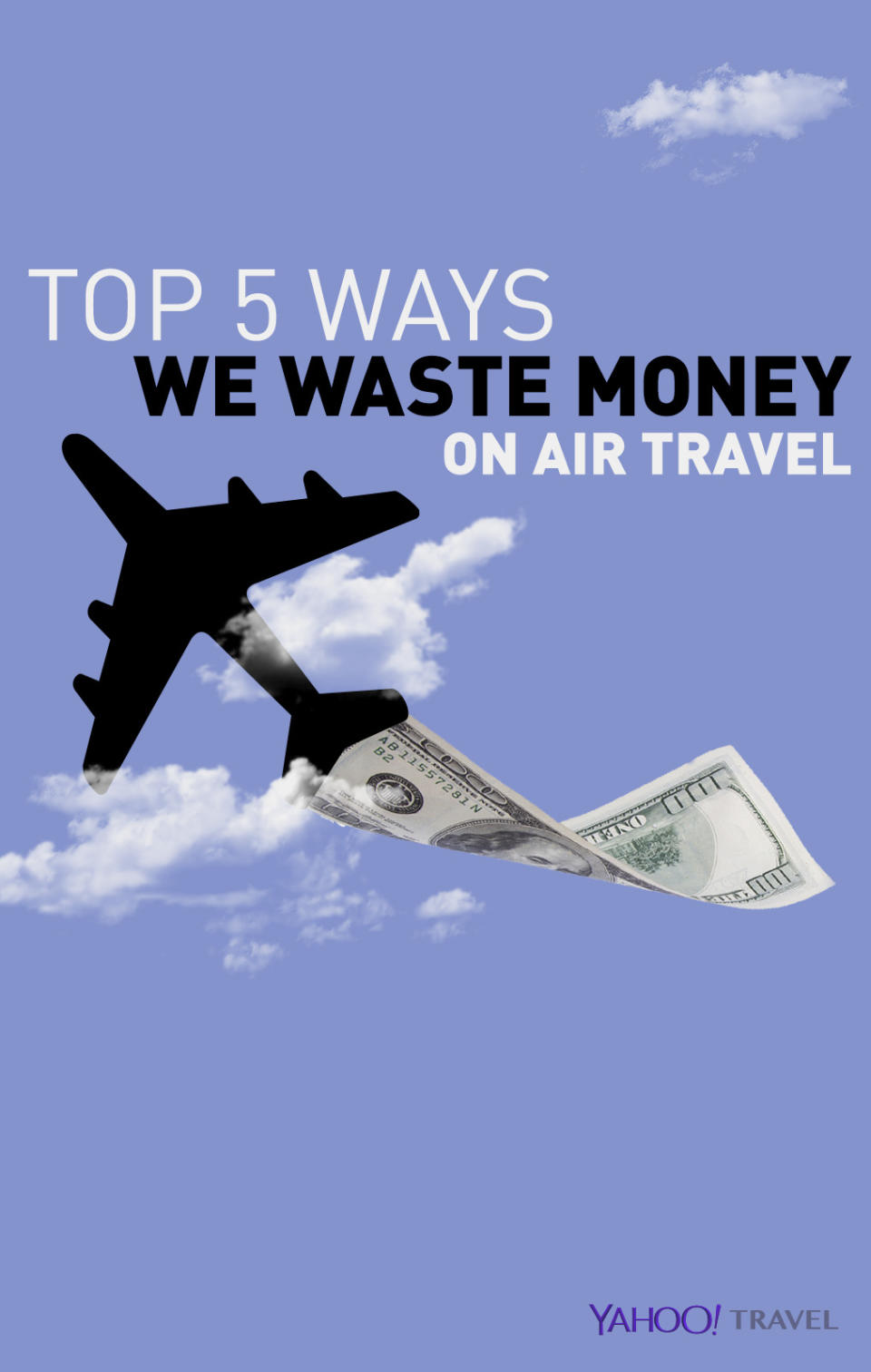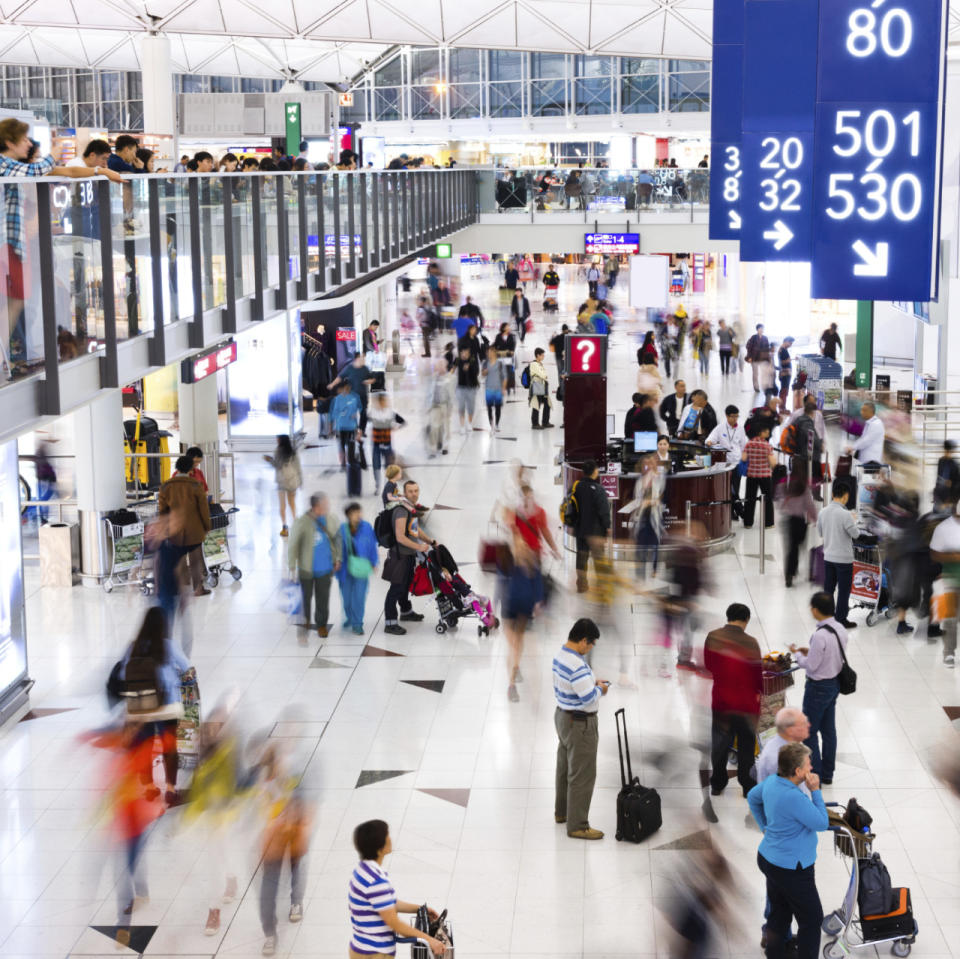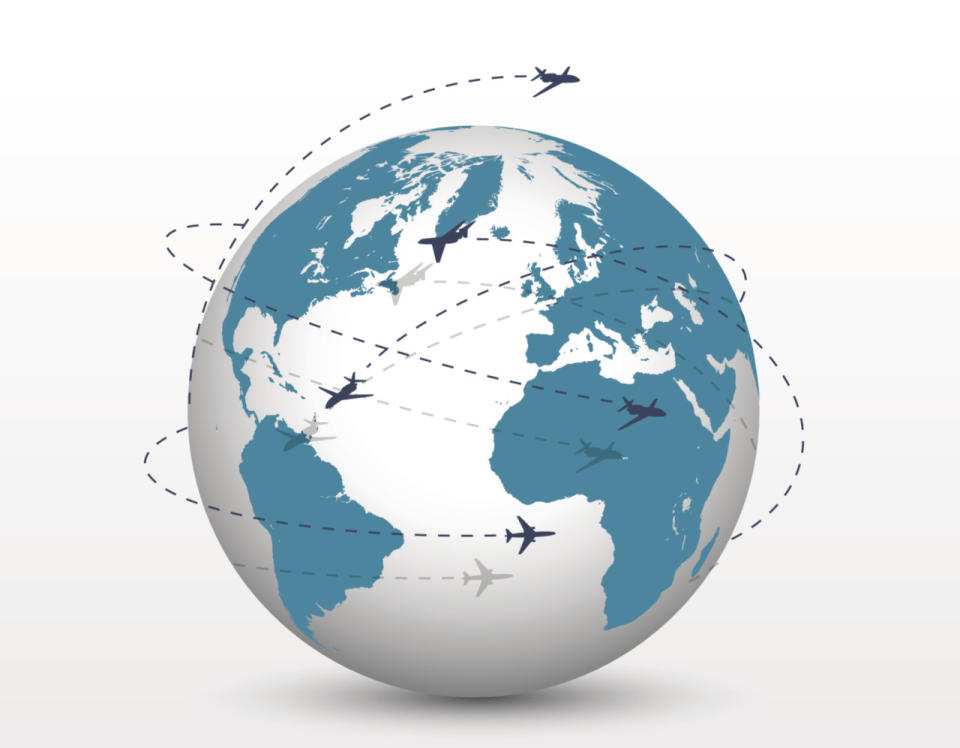Top 5 Ways We Waste Money On Air Travel
Last quarter, U.S. passenger airlines pulled in $5.5 billion dollars in net income, their biggest haul since 2007. And in the industry’s last annual report, U.S. airports said they pulled in $18.2 billion dollars in total operating revenue.
In short, the air travel industry does not need your donations.

Too many flyers are throwing too much money at airlines. (Design by Erik Mace for Yahoo Travel)
And yet, we air travelers dump a lot of our hard-earned money into the industry’s coffers as if it were our favorite charity — money that, unless we’re also raking in billions of dollars, we need more than they do. From paying fees we could have easily avoided, to purchasing higher fares than we had to, to buying overpriced things in airports, too much of what we passengers spend our money does nothing but swell the airlines’ balance sheets while unnecessarily depleting our own bank accounts.
Well, the insanity stops now. No one is against air travel industry making money. But we’d rather they earn it with great service instead of waiting for us to mindlessly throw our money at them. Here are Yahoo Travel’s top five ways we air travelers consistently waste our money:
1. Being a victim of bad timing

Timing is everything when it comes to saving money on flying, or wasting it. (Illustration: iStock)
The easiest way to waste your money flying is through bad timing — both booking your flight at the wrong time or flying at the wrong time of day or day of the week. So take the time to find out the best times to do your flying and booking.
In an in-depth analysis of plane fares, the folks at Hopper.com found that airline passengers pay about 3 percent higher fares when they book on Fridays at around 3 a.m., so they recommend you avoid late-night/early-morning ticket-shopping binges late in the week.
Hopper also says the cheapest day to leave for your trip is Wednesday (when relatively few people fly), while the most expensive day is Sunday (when just about everyone is flying to get back to work Monday). As for your return flight, Tuesday was found to be the best day for you to return from a domestic trip, while Wednesday was the best day to head home from an international trip. All told, Hopper says flying on the right days could save you an average of $85 on domestic flights and $120 for international flights.
There’s also the matter of how far ahead you book your flight. In its 2014 analysis, CheapAir.com found the best time to book domestic fares was 47 days in advance of your trip. CheapAir finds buying too late can cost you an additional $111 if you buy within 14 days of your flight, and an extra $174 if you buy within seven days. Buying too early can be expensive, too: CheapAir says tickets can be about $50 more if you jump on them when they first open for sale.
So in flying, time really is money — or money wasted if you time it poorly.
2. Engaging in baggage follies
Americans literally waste billions on excess baggage. According to the Department of Transportation, U.S. carriers collected more than $3.5 billion in baggage fees last year. Airlines generally charge anywhere from $15- $45 to check your first bag and even more to check additional bags (Southwest Airlines doesn’t charge for checked bags but, like a Hollywood marriage, we’re not placing any bets on that policy lasting forever).
You can avoid the money-wasting folly of checked baggage by, of course, packing all your stuff in a carry-on. Be brutally spartan with how much, or how little, you pack on a trip. And for what you do bring, learn how to pack tightly and efficiently. Most major airlines still let you carry on for free, with the exception of budget airlines like Allegiant, Frontier, and Spirit. (Be sure you account for that when comparing their cheap fares with other airlines.)
Related: Brittany’s Travel Hacks: How to Never Check a Bag Again
Sometimes checking bags is inevitable, though. In that case, it’s crucial to avoid exceeding the baggage weight limit. Depending on the airline, overweight bags (generally defined as more than 51 pounds) can cost you up to $100 on top of the money you paid to check it in the first place. Buy a handy luggage scale so you can weigh your bags at home and avoid any nasty and expensive surprises when your bag’s weighed at the airport. And whether you’re checking or carrying on, make sure your bag itself doesn’t exceed the size limit or else you could end up paying yet another fee. AirfareWatchdog.com has a handy rundown of the major domestic air carriers’ baggage fees.
Related: Save on Baggage Fees By Slapping an Ad on Your Suitcase
So be careful about your luggage. You’re already paying to bring yourself on a trip. Why waste your money by paying to bring your stuff, too?
3. Buying stuff at the airport

Of course shopping in airports is a common money waster — they’re generally not known for their bargains! (Photo: iStock)
Generally speaking, buying stuff at the airport isn’t as expensive as it once was. According to a survey by Airports Council International — North America, 92 percent of airports in the U.S. and Canada cap the amount airport concessions operators (specialty retail stores, restaurants, duty-free and gift shops, etc.) can charge passengers.
Related: Every Important U.S. Airport, Ranked by Its Food and Drink
But looking at wasted money is not a glass-half-full endeavor — not when our hard-earned money is paying for the glass and the water. Fact is, in 49 percent of North American airports, stores, and restaurants are allowed to add a markup, usually up to 5 or 10 percent, above “street prices” for their goods. That’s 5 or 10 percent more you simply would not have paid had you bought that item outside an airport. Yes, you often have to buy food and water before your flight. But with all the high-end retailers populating airports these days, many of which are able to mark up their goods, an airport is a less-than-ideal place to window shop for clothes and electronic gear. If you feel the need to do so, check to see what pricing policy your chosen airport operates under. Otherwise, if you can help it, don’t buy at the airport what you can easily buy outside the airport.
4. Vacationing when everyone else is

Following the crowd is expensive when it comes to travel. (Photo: iStock)
Traveling during the spring and summer often gets you nice weather at your destination. But it also gets you crowds and more expensive airfares. Many people would have been better off taking advantage of what’s called “the shoulder season” — that glorious time between peak and off-peak travel seasons when fares to particular destinations tend to be lower but the climate is still nice enough to enjoy the trip. The time of year that constitutes shoulder season varies from place to place, but generally it’s considered Labor Day to Dec. 15 in the fall and April to mid-May in the spring. For many places in Europe, shoulder season is underway right now, when airfares can be up to 50 percent lower. Why pay more to follow the crowds when vacationing at your own time can save you so much money?
5. Not getting the maximum bang for your buck with frequent flyer miles

If you blow your frequent flyer miles now, you could end up paying more cash later. (Photo: Thinkstock)
The allure of getting a free ticket with the miles you earned from your credit card and/or airline frequent flyer program is almost irresistible. But too often, travelers don’t get the maximum bang for their buck. Spending 25,000 miles — the minimum amount many airlines will let you redeem for a roundtrip domestic economy-class seat — on a ticket you could otherwise buy cheaply is a waste. But too many people blow all their miles on, say, a $400 ticket only to find themselves paying $1,000 for a future trip they could have gotten for free had they been more strategic with their miles. Smarter Travel recommends that if the purchase price for the ticket in question is significantly less than two cents per frequent flyer mile (for example, a $500 ticket at 25,000 miles), and you’re likely to fly a more expensive flight in the near future, you’re better off just buying the cheap ticket and saving your miles for a more expensive trip — or for upgrading to business or first-class.
By following these tips, you can make sure you’re spending no more than you have to when you fly. Don’t worry about the airlines; they’ll be just fine without your “donations” — especially if you use the money you save to buy take more trips!
“Biggest Waste of Money” is a new series from Yahoo Finance.
WATCH: A Broad Abroad — Seeking Mongolia’s Secret Natural Wonder
Yahoo Travel inspire you every day. Hang out with us on Facebook, Twitter, Instagram, and Pinterest. Watch Yahoo Travel’s original series “A Broad Abroad.”

